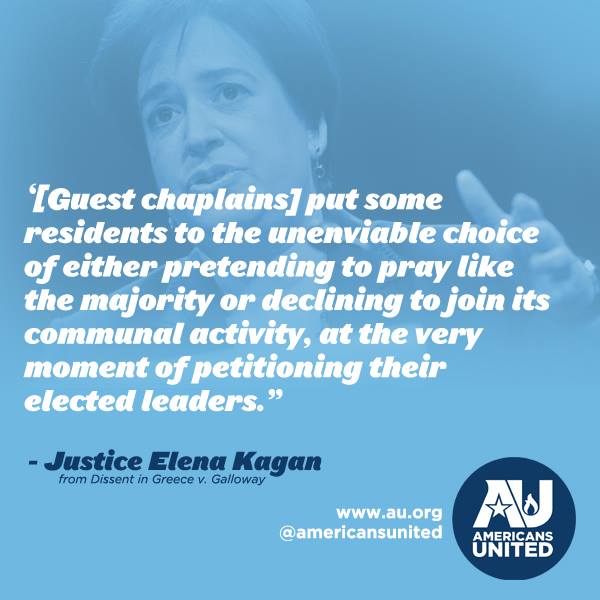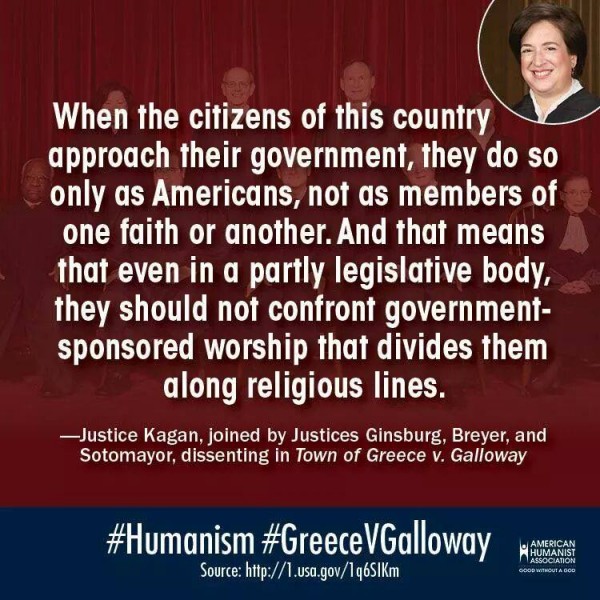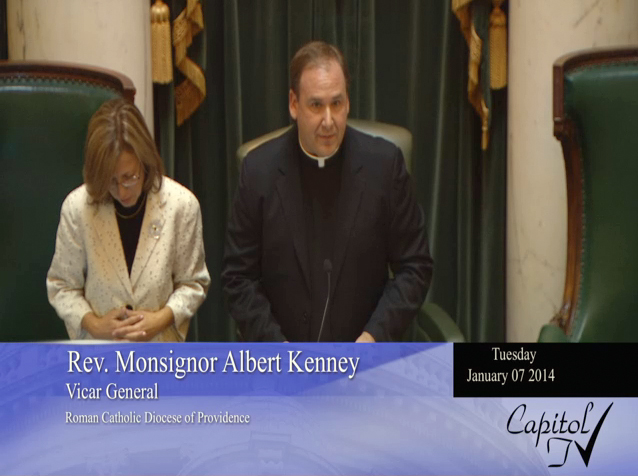 A few days ago the Supreme Court gave a thumbs up to government sanctioned Christian prayers taking place before secular government meetings. For nonbelievers and believers alike, this was a disappointing decision.
A few days ago the Supreme Court gave a thumbs up to government sanctioned Christian prayers taking place before secular government meetings. For nonbelievers and believers alike, this was a disappointing decision.
To many millions of people, prayer is an important part of their lives. It can be a meditative and calming practice, and a direct path to accessing the mind and grace of a God. It can be a deeply moving process of extreme intimacy and importance.
Ceremonial prayer, by contrast, has long been acknowledged as religiously meaningless. As Justice Kennedy says in his decision,
Ceremonial prayer is but a recognition that, since this Nation was founded and until the present day, many Americans deem that their own existence must be under stood by precepts far beyond the authority of government to alter or define and that willing participation in civic affairs can be consistent with a brief acknowledgment of their belief in a higher power, always with due respect for those who adhere to other beliefs. The prayer in this case has a permissible ceremonial purpose. It is not an unconstitutional establishment of religion.
Such prayers are not attempts to secure the favor of a God, they are merely acknowledgments of the fact that some people can’t perform ordinary tasks without first rooting themselves in the mythology of their ancestors. If the prayers were true attempts to contact a God, then they would run afoul of the Supreme Court decision. The prayers, in the context of government meetings, must be ceremonial, or they become illegal.
 This state of affairs poses the true believer an ethical dilemma. When participating in the prayer, the true believer must go through all the motions of prayer without actually engaging in real prayer. They must, in effect, pretend to be praying, because the kind of prayer permitted by law must be ceremonial by nature. (Now, this is doubly confusing from an atheist perspective, because prayer is viewed as attempted communication with an imaginary being. The law now mandates that believers pretend to attempt communication with an imaginary being, which just seems a step too far.)
This state of affairs poses the true believer an ethical dilemma. When participating in the prayer, the true believer must go through all the motions of prayer without actually engaging in real prayer. They must, in effect, pretend to be praying, because the kind of prayer permitted by law must be ceremonial by nature. (Now, this is doubly confusing from an atheist perspective, because prayer is viewed as attempted communication with an imaginary being. The law now mandates that believers pretend to attempt communication with an imaginary being, which just seems a step too far.)
People of many religious faiths might take exception to the idea that they must, for secular purposes, play-act elements of their faith in a secular public forum. Some take their religion very seriously, and to perform prayer cermonially may violate their conscience. These people, when confronted with such a dilemma, might pray for real, not just pretend to. In such cases, even though it will be impossible to prove or to demonstrate, the First Amendment will be violated, according to the Supreme Court.
Some people of faith will therefore have an impossible decision: They can either betray their God by falsely praying or betray their country by truly praying, an impossible conundrum the concept of separating church and state was invented to avoid. The First Amendment was born out of a desire to protect the conscience of American citizens. In this respect, Greece versus Galloway was a very unfortunate decision for religious believers.
 Atheists and Humanists by comparison, won’t have it that bad. Would we have preferred to have ceremonial prayer simply done away with? Certainly. We do not want to feel pressured to violate our consciences by pretending to pray. We don’t like the idea that when we show up at a legislative hearing to plead our case that we can immediately be marked as outsiders because we refuse to participate in the prayer.
Atheists and Humanists by comparison, won’t have it that bad. Would we have preferred to have ceremonial prayer simply done away with? Certainly. We do not want to feel pressured to violate our consciences by pretending to pray. We don’t like the idea that when we show up at a legislative hearing to plead our case that we can immediately be marked as outsiders because we refuse to participate in the prayer.
A different outcome in Greece v. Galloway would have protected the consciences of the nonreligious and religious alike, but Kennedy’s decision contains the interesting caveat that ceremonial prayer must always be done “with due respect for those who adhere to other beliefs.” The decision also mandates that the prayers do not “denigrate nonbelievers or religious minorities, threaten damnation, or preach conversion.” Finally, local governments must make “reasonable efforts to identify all of the congregations located within its borders” and welcome an invocation by anyone who wishes to give one, regardless of their faith.
This means that the State of Rhode Island, as well as all its cities and towns, must open their ceremonial prayer process to “all of the congregations located within its borders” and this includes, for purposes of the law, nonbelievers. Already the American Humanist Association has started a registry for people certified to do secular invocations. Humanists and atheists across the country are signing up, ready to enter town halls and other legislative bodies with the intention of offering ceremonial platitudes that do not “denigrate nonbelievers or religious minorities, threaten damnation, or preach conversion.”
We already have at least two Humanists/atheists ready to deliver ceremonial invocations in Rhode Island, and we’ll have many more lined up soon.
May heaven help those who try to stop us.*
*not an actual prayer
]]>
“Let us remember we are in God’s holy presence…”
With those words did the Reverend Monsignor Albert Kenney, Vicar General of the Roman Catholic Diocese of Providence, begin his convocation at the opening of the 2014 legislative session in the Rhode Island State Senate. As Senate President M. Teresa Paiva-Weed stood by his side, hands clasped and head bowed in reverence, Kenney continued:
We pray to you, O God of might, wisdom and justice, source of all legitimate authority. Assist us with your gifts of counsel and fortitude to the members of the Rhode Island State Senate that their legislative efforts may be conducted in righteousness and truth by encouraging due respect for virtue: the practice of religion by a faithful execution of laws and justice and mercy.
On November 6th of last year the United States’ Supreme Court heard arguments in Town of Greece v. Galloway, about the legality of and permissible scope of legislative prayers of this nature. The Town of Greece, in New York has allowed various clergy (almost all Christian) to open their legislative sessions for the last eight years. Susan Galloway, who is Jewish and Linda Stephens, an atheist, filed suit in 2007 because Christian prayers opening a secular, legislative session of government gives the impression that Jews and atheists are, at best, second class citizens.
The Supreme Court has not been exactly consistent about invocations, convocations and “ceremonial” prayer. In Marsh v. Chambers (1983) the court allowed the Nebraskan legislature to begin its deliberations with prayers from a resident chaplain on the claim that such prayers were ceremonial and not impositions of Christian hegemony. However, in 1992’s Lee v. Weisman a case from right here in Rhode Island, ceremonial prayer was held to be unconstitutionally coercive if done at a high school graduation ceremony.
In Town of Greece v. Galloway, the Supreme Court could rule any number of ways, but it is doubtful that so conservative a court will make the practice of legislative prayer illegal. On the other hand, non-sectarian prayers seem equally problematic. Take this court exchange, as reported by the New York Times:
“How could you do it?” Justice Alito asked. “Give me an example of a prayer that would be acceptable to Christians, Jews, Muslims, Buddhists, Hindus … Wiccans, Baha’i.”
“And atheists,” Justice Antonin Scalia added. “Throw in atheists, too.”
Mr. Laycock [the attorney representing Galloway and Stephens] reminded the justices that atheists were already out of luck based on the court’s prior decisions. Then, riffling through his documents, he suggested, “The prayers to the Almighty, prayers to the Creator.”
“To ‘the Almighty,’” Justice Alito said skeptically. “So if — if a particular religion believes in more than one god, that’s acceptable to them?”
Justice Scalia, often impatient in religion cases, couldn’t resist. “What about devil worshipers?”
Over the laughter of the courtroom, Mr. Laycock said meekly, “Well, if devil worshipers believe the devil is the almighty, they might be okay. But they’re probably out.”
Back in the Rhode Island State Senate last night, Reverend Kenney was making exactly no effort to be nonsectarian. His prayer was explicitly Christian if not expressly Roman Catholic. As the Vicar General of the Providence Roman Catholic Diocese, a diocese that makes a point of embroiling itself in political issues based on its particular theological aims, Kenney’s presence was no mere formality. This was not an innocuous or ceremonial convocation.
Kenney’s words were a way of framing the work of the Rhode Island General Assembly as a religious undertaking. This was an attempt to bring church and state together, to align the goals of the state with the goals of the church, the specific state being Rhode Island, and the specific church being Roman Catholicism.
Kenney continued,
Let the delight of your divine wisdom direct the deliberations of elected officials and allow that light to shine forth in all proceedings so that they may tend to the preservation of lasting peace and the promotion of true happiness. We also pray for the executive officials of the State of Rhode Island, for all members of the Assembly, for all judges, magistrates and other officers that they may be enabled by your powerful protection to discharge the duties of their respective stations with honesty and integrity.
The ideas that Kenney is endorsing should be anathema to religious and nonreligious Americans alike because these words do not seek to unite us as individuals with different beliefs but divide us. The pecking order is clear: Those who believe in the right God are first, those who believe in the wrong god are second, and those who believe in no god(s) or have beliefs that are difficult to classify, well, as Mr. Laycock suggests, “…they’re probably out.”
Kenney concluded his Rhode Island State Senate convocation with,
And finally we recommend likewise to your infinite providence all our fellow citizens throughout the State of Rhode Island that we may be blessed in the knowledge and sanctified in the observance of your most holy law that we may persevere in our call to promote unity through the gift of holy charity and after enjoying the many blessings of this life we pray we may be admitted to those which are eternal. Grant this O Lord in your mercy and justice which find perfect fulfillment, Amen.
Vicar General Kenney might want to see all Rhode Islanders “blessed in the knowledge” of his God’s “most holy law” but the Senate chamber of the Rhode Island State House is not the place and the opening of the 2014 legislative session is not the time for the cleric to make this point. Kenney might believe that his God is the “source of all legitimate authority” but the last time I checked, legitimate authority rests with “We the People.”
No Gods need apply.
Regardless of how the Supreme Court decides Town of Greece v. Galloway, Rhode Island legislators should seriously consider doing away with legislative prayers. Rhode Island, as I often point out, is the birthplace of separation of church and state and the very first secular government established anywhere on the planet. Our state guarantees rights based on the primacy of conscience and on a strict policy of not imposing our beliefs on one another.
Rhode Island once showed the world how to be a better place.
We can do that again.
]]>